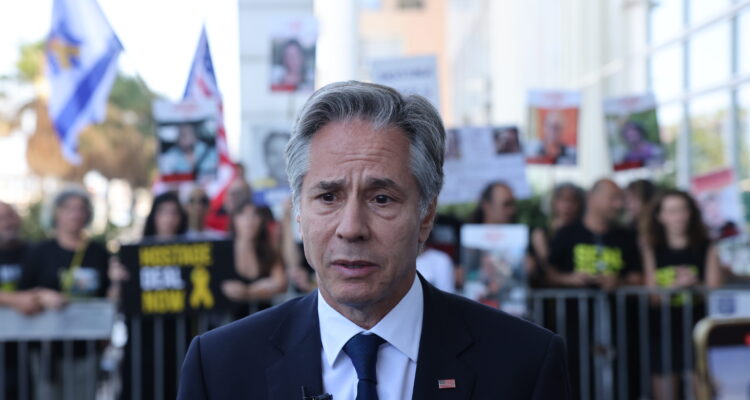Hamas is seeking written guarantees from the Biden administration for a permanent ceasefire and the withdrawal of IDF troops from the Gaza Strip.
By Charles Bybelezer, JNS
Hamas’s official response to Israel’s hostages-for-ceasefire proposal included modifications that are not workable, U.S. Secretary of State Antony Blinken said on Wednesday.
“Hamas has proposed numerous changes to the proposal that was on the table. … Some of the changes are workable, some are not,” Blinken said in a press conference alongside Qatari Prime Minister Mohammed bin Abdulrahman Al Thani in Doha.
“A deal was on the table that was virtually identical to the proposal that Hamas made on May 6—a deal that the entire world is behind, a deal Israel has accepted. Hamas could have answered with a single word: ‘Yes,’” the secretary said.
“Instead, Hamas waited nearly two weeks and then proposed more changes, a number of which go beyond positions that had previously taken and accepted,” added the top American diplomat, who was in Israel for a two-day visit earlier this week.
“As a result, the war Hamas started on October 7 with its barbaric attack on Israel and on Israeli civilians will go on. More people will suffer, more Palestinians will suffer, more Israelis will suffer.”
Blinken nevertheless said that “in the days ahead, we are going to continue to push on an urgent basis with our partners, with Qatar with Egypt, to try to close this deal. Because we know it’s in the interests of Israelis, Palestinians, the region, indeed the entire world.”
On Tuesday night, Hamas submitted to Egyptian and Qatari intermediaries its formal response, including “amendments” to the proposal that Israel said were tantamount to a rejection.
An anonymous Israeli official was widely cited panning the terrorist group, which had “changed all of the main and most meaningful parameters” of the deal.
Reuters reported on Wednesday, citing two Egyptian security officials, that Hamas is seeking written guarantees from the Biden administration for a permanent ceasefire and the withdrawal of IDF troops from the Gaza Strip as a condition for signing off on the proposal.
The report also said Hamas wants explicit guarantees over the transition from the first phase of the plan, which includes a six-week truce and the release of some hostages, to the second phase, which includes an end to the war and Israeli pullback.
Hamas also proposed a new timeline for the phases.
The White House
On May 31, President Joe Biden laid out the terms of the proposal in an address from the State Dining Room at the White House.
“The first phase would last for six weeks,” he said. “Here’s what it would include: a full and complete ceasefire. The withdrawal of Israeli forces from all populated areas of Gaza. Release of a number of hostages, including women, the elderly, the wounded, in exchange for the release of hundreds of Palestinian prisoners.”
That phase, which would also include the return of the remains of dead hostages and the daily delivery of 600 trucks of aid to Gazans, would lead to an indefinite period of negotiations between Israel and Hamas to end the war, Biden said.
“During the six weeks of phase one, Israel and Hamas would negotiate the necessary arrangements to get to phase two, which is a permanent end to hostilities,” the president added. “The proposal says if the negotiations take longer than six weeks from phase one, the ceasefire will still continue as long as negotiations continue.”
The United States, Egypt and Qatar “would work to ensure negotiations keep going until all the agreements are reached and phase two is able to begin,” Biden added.
In the second phase, “Israeli forces will withdraw from Gaza” and “release additional Palestinian prisoners in exchange for the release of all remaining living hostages,” the president said. Quoting the text of the proposal, he said that at that point, the ceasefire would become “the cessation of hostilities permanently.”
The third phase would include the reconstruction of Gaza and the return of any remaining dead hostages. During this stage, the international community would ensure that Hamas does not rearm.
Last week, leaders of 16 countries, including many whose citizens were taken hostage by Hamas on Oct. 7, issued a statement backing the proposal. Noting that Jerusalem was “ready to move forward” with the terms, they called on the Gaza-based terrorist group to “close this agreement.”
“There is no time to lose,” read the statement signed by the leaders of Argentina, Austria, Brazil, Bulgaria, Canada, Colombia, Denmark, France, Germany, Poland, Portugal, Romania, Serbia, Spain, Thailand and the United Kingdom. The United States also signed the statement.
On Monday, the United Nations Security Council adopted a U.S.-drafted resolution backing the three-phase plan to end the war. Noting that Israel had accepted it, the resolution calls for Hamas to do the same, and for both sides to “implement its terms without delay and without condition.”
In an interview with Time magazine published earlier this month, Biden described the Israeli ceasefire offer as “very generous.”
“The last offer Israel made was very generous in terms of who [Palestinian prisoners] they’d be willing to release, what they’d give in return, et cetera. Bibi [Prime Minister Benjamin Netanyahu] is under enormous pressure on the hostages … and so he’s prepared to do about anything to get the hostages back,” said Biden.





